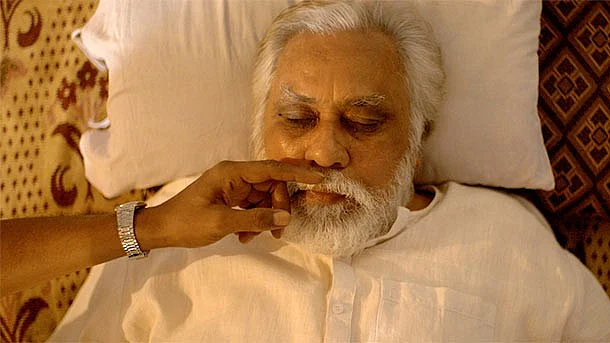On the surface, Mukti Bhawan seems like that rare film which treads a territory few Indian films dare to get into. Shubhashish Bhutiani’s directorial debut deals with the idea of mortality, embracing death in waiting, and the hotel that enables this peculiar idea.
So we find 77-year-old Dayanand Kumar (Lalit Behl), announcing at the dinner table that his time has come, that he wishes to go to Mukti Bhawan in Varanasi to wait for his death. His middle-aged son Rajeev (Adil Hussain), daughter-in-law Lata (Geetanjali Kulkarni) and granddaughter Sunita (Palomi Ghosh) are baffled, but the matter-of-factly declaration establishes it quickly that the old man means business. Rajeev, battling workload and familial obligations, succumbs to his father’s demand, and travels with him to take us to the holy city and the legendary hotel.
Till here, the film has the window of a promise that could sing to the length of a narrative. But as we proceed with the father-son story, a strange sense of despair takes over, not due to what the film is trying to convey but because what entails that telling.
Hindi cinema is always torn between two extremes – the popular flashy exercise that speaks about a world that’s cured of all socio-economic ills, and offers escapism for the happy end seeking audience.
The other end of the spectrum, sadly, is the one that seeks to grace the most prestigious festivals of the world, by identifying with the overriding paradigms of the west, popularly termed as festival bait.
Both ends of cinema try to create their own independent lore – India shining bright for the former, while the other holds the exotic India, frozen in time providing endless wonder.
Bhutiani’s film is a textbook example of western gaze, yet stands apart from films usually blamed for such excursions. Films like The Best Exotic Marigold Hotel, The Darjeeling Limited or Indiana Jones and the Temple of Doom perpetuated the myth of India by going the whole hog in the exotica chamber with deserts, elephants, and black magic thrown in, but they are all very obvious examples.
Bhutiani however, brings the story of Mukti Bhawan slyly, keeping things understated, but employs the perspective of an outsider to look at the city famous for being the focal point learning and burning.
David Huwiler and Michael McSweeney’s camera captures Varanasi with all its exotic details – the narrow lanes, boat rides, sadhus, Ganga aarti, and the crematorium on the riverbank et cetera et cetera. The psychological penchant of the camera tells us, we are here not to come in conflict with prevalent ideas, we are merely transmitters of consoling fables.
So when the father wants milk, the son goes to a cowshed to request for milk, instead of going to a dairy. And as the son jostles for space in a frame with cows, we are supposed to understand the myth of a city that hasn’t progressed from the ancient to the modern. The city, bustling with people, professions, languages and their sounds get nullified because stylistic purity allows the father and son to move only in the exotic space, even though they spend a fortnight just waiting.
Bhutiani does a Marco Polo (who famously omitted the Great Wall of China and the art of printing in China in his travelogue), by quietly reducing a place to its pre-conceptions.
Mukti Bhawan takes the tragicomic route to comprehend the absurdity of waiting for death, and to its credit, there are a few scenes that burst with comic alacrity, but those are few and far between. The narrative is a flatland of emotions, where movements are few, and scene after scene overstays its welcome.
Bhutiani’s use of Mukti Bhawan as the location appears like the many news outlets that covered the place as a striking idea of the spiritual strangeness of the east, he is never really invested in the milieu beyond the assessment of a foreigner. This is a travesty because we are witnessing a time when emerging filmmakers are telling stories of places they know and understand, without being myopic.
Nagraj Manjule’s Fandry (2013), Chaitanya Tamhane’s Court (2014), Kanu Behl’s Titli (2014) or Raam Reddy’s Thithi (2016), these are filmmakers who are invested in the dirt, grime, and absurdity of the worlds their films inhabit.
Bhutiani, despite being an Indian, chooses the western contemplation, with a refusal to enter into a proper dialogue with his subject.
If Julia Roberts found a spiritual awakening of how to live a life in Eat, Pray, Love (2010), Mukti Bhawan wishes to show us the contrarian canvas of how to come to terms with death.
And it presents this wisdom with the strident spirituality that plagues the self-help section at bookstores. Written by Bhutiani himself along with Asad Hussain, the dialogues carry a ‘translated’ feel, without providing much insight. In the quest for transcendence, it offers banality.
Mukti Bhawan reminded me of The Backwards Episode of Seinfeld in which George, Elaine and Jerry travel to India to attend a wedding. The episode had all the clichés mixed like heat and dust about India one could possibly think of, but most amusingly, George refuses to use the bathrooms. By the time Mukti Bhawan ended, I could imagine the plight of Bhutiani.
After all, George had the right wisdom, “Just remember... It’s not a lie if you believe it.”
(The writer is a journalist and a screenwriter who believes in the insanity of words, in print or otherwise; he tweets @RanjibMazumder)
Join The Quint on WhatsApp. Type “JOIN” and send to 9910181818
(At The Quint, we question everything. Play an active role in shaping our journalism by becoming a member today.)
